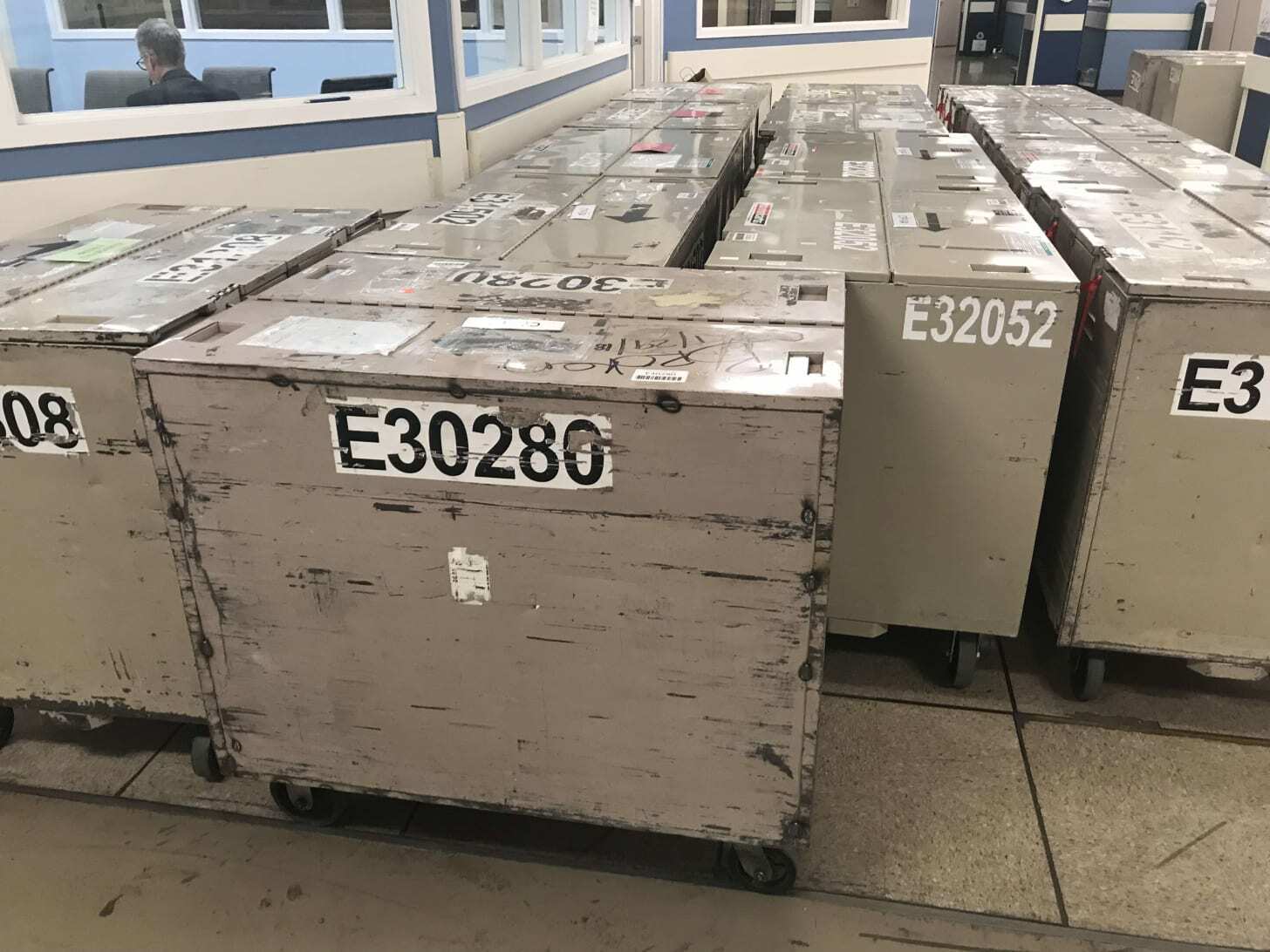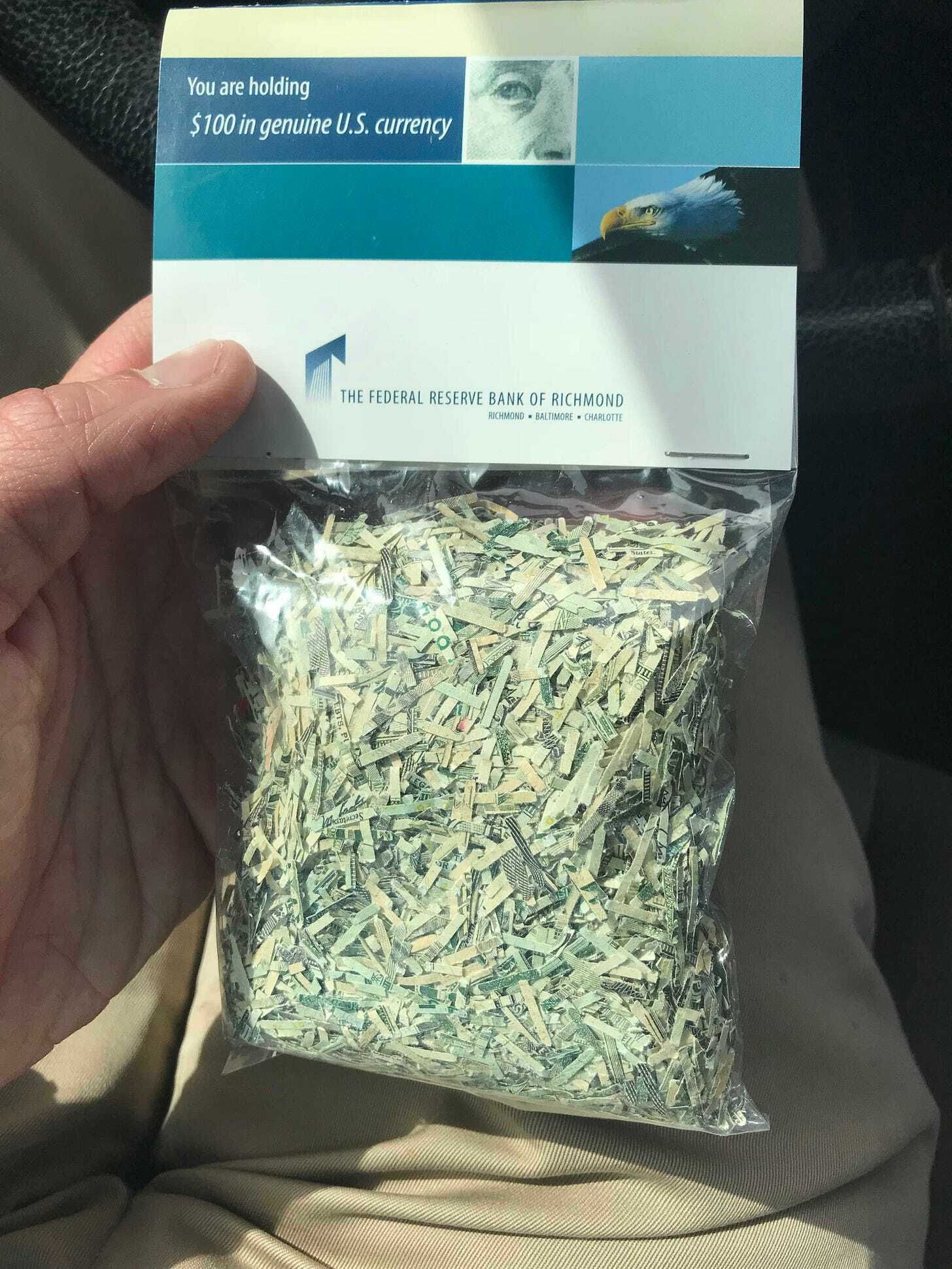Once, I got to look into a vault with billions of dollars inside. That’s enough money to power the entire economy of Latvia, Iceland, or El Salvador for an entire year. The vault itself was buried underneath the ground in Uptown Charlotte. It stood three stories high and was the width of two basketball courts. To get there, I had to pass through layers upon layers of security. Cameras were everywhere. The walls were made from thick steel. I was not allowed to step into this vault. Few humans are.
Before we go on, I want you to stop for a moment. Close your eyes. Think about that last paragraph. Imagine what this room might look like. (I’m not saying that you’re me, but every time I do this, my brain conjures up Scrooge McDuck’s vault from the opening of DuckTales. It also conjures up the DuckTales song to go along with it. Music is powerful.)
Okay. Got it?
Now open your eyes.
And take a look at this boring-ass room:

Look at it! Not a single piece of gold! Not one damn sack with a dollar sign on it! No glittering doubloons or bearer bonds! No field of Tom Cruise-proof lasers! Not one buff dude in Oakleys holding a machine gun! Still, there are tens of billions of dollars in that room. It’s possible that you could crack one of those bins open and find $28 million. That’s enough money to support you, your family, and your descendants forever. Hell, that might be true for your whole neighborhood. And yet, look at how beige everything is. Ew.
What you’re looking at is the Federal Reserve’s cash vault in Charlotte. Back in 2018, I did a whole podcast episode about it. And from time to time, I bust out a picture of this place just to impress people. The most recent victim was my son. He was not impressed. Every time I look at this picture, a picture that literally depicts enough money to buy more than a hundred fighter jets with a few billion dollars left over, I want to yawn. It makes me sleepy.
But that’s okay. This vault is not there to impress you. It’s not there to make you cower in awe. It’s there because it needs to be. It’s there to make stuff work.
I don’t know about you, but I’m a bit paralyzed right now. There is so much news coming out of Washington, and almost all of it is bad. Where do you even start? What can I possibly address right now that won’t be replaced by another, more depressing story tomorrow?
I haven’t been able to come up with some thoughtful way to express what I’m feeling lately. I have hope. But also dread. There’s a lot on my mind, but if there’s one broad worry that I have at the moment, it’s this: What happens if stuff stops working?
I’m not naive enough to think that everything works now. I know that even though it’s on the menu, ordering a McFlurry is a dicey proposition. I know that mechanics can’t seem to make the check engine light on my Chevy turn off, even though it seems to be running just fine. I know that no matter how much I recycle, I can’t keep all trash out of the ocean. And I know that, as a white man who lives in a suburban spot of North Carolina with his family, I’m privileged. A lot of things that work for me may not work for you.
But take, for instance, the amount of things that work without you thinking about them. Order something from Amazon. Try and think about the process of getting an individual package from some far flung warehouse to you. How much computing power it requires. How many people are involved. How it changes the calculus about how many things you buy, the convenience of finding products you once couldn’t find, and the stores you no longer visit as a result.
Or, go to a park, and ponder the effort necessary to carve out and maintain a space that’s free for you to enjoy. Maybe get in the car, and consider the logistics of building a smooth stretch of pavement between where you currently are to anywhere you might want to go. Turn on your water. Flip on a light. Eat a sandwich. Send a text message. Take an aspirin. If you had to stop and think about how anything worked before you used it, you’d never get anything done. Or maybe you’d be overly grateful. After years of trying to garden, I can’t help but see the produce section at the grocery story as a miracle. Do you know how hard it was for me to grow one stupid watermelon a few years ago? Really, really hard! And I don’t even like watermelon!
It’s easy to take the sheer volume of this stuff for granted until it’s gone. In 2018, Hurricane Michael washed out a bridge over the creek that separates Oak Ridge from Summerfield. It took months to replace. In an instant, a three-mile, five minute drive to my in-laws’ house became a 10-mile, 15 minute trip. It changed all sorts of routines and plans. I never thought about that bridge until one day, it wasn’t there. I was grateful when it finally re-opened. Then I stopped thinking about it. Why? Because it’s supposed to work.
It’s important to understand how things work, even if you don’t think about them a lot. At the moment, we’re all learning a lot about how our federal government functions. About the people and processes and protections that are supposed to make everything keep working. If there’s any silver lining to what’s happening, it’s that we’re beginning to understand just how big of an effort it is, imperfect or not.

Which brings me back to the vault. When I was there in 2018, I got a tour from Kelly Stewart, who ran the cash operations at the Charlotte Fed. She was very nice, but I got the impression that she wasn’t all that impressed with my DuckTales references and my questions about aesthetics. Instead, she said, you have to understand the purpose of this place.
For example: Let’s say there’s a hurricane coming. After it hits, the power’s going to be out. ATMs won’t work. Debit and credit cards would be useless. People are still going to need money to live their lives. So in those instances, the Charlotte Fed would make sure that banks in North and South Carolina would have enough physical cash on hand to meet their customers’ demand (The Fed, basically, is a bank for banks). After a storm, people are going to have wet, soggy, or ripped bills. Those bills get deposited at banks, and the banks send them to the Fed, where they’re fed into a machine. If a bill is in good enough shape, it comes out the other side. If it’s not, it’s shredded on the spot. Some of the resulting currency confetti is given away as tchotchkes:

The Fed does all sort of stuff. It sets interest rates, monitors inflation, and checks on the health of the overall economy. It also (still) clears paper checks. (If you’d like to know more about how the Charlotte Fed works, Mark Washburn wrote a great series of stories for The Charlotte Ledger last year.) But mostly, it helps provide part of the full faith and credit behind every single $1, $5, $10, $20, $50, and $100 bill out there. Cash has to go where’s needed. It takes a lot of people, planning, and trust to make it all happen. A lot of work happens behind the scenes to make that you don’t have to stop and consider the logistics of money every time you want to use it.
Stewart explained it to me this way:
The great thing about really a lot of payment options is that we, as consumers, don't have to think about them when we're using them. So, if we go to an ATM, we expect cash to come out. And we know what cash is going to do when we use it. We don't think about it when we swipe a debit card. We don't really think about how the transaction flows, or the inner workings behind it. We just trust that it's going to work when our paycheck gets deposited into our accounts. You don't have to think about your payment choices. You trust that they'll work, but they work because we work. That's key.
After my tour, I walked out of the Federal Reserve building in Charlotte (which is the most ‘90s-looking building in a city full of ‘90s-looking buildings) and found myself standing on a sidewalk on East Trade Street. Cars drove by. A few people walked past, heading to lunch or back to the office. Most of them probably were not thinking, or blissfully unaware, of the billions of dollars beneath their feet. I was thinking of all of the people down there, just out of sight, making sure that I don’t have to think about them. Things work because they work.
